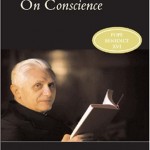Benedict XVI’s first encyclical, which we talked about talked about last week, is called Deus Caritas Est – God is Love – and it is released today.
In a world where the name of God is sometimes associated with vengeance or even a duty of hatred and violence, this message is both timely and significant. For this reason, I wish in my first Encyclical to speak of the love which God lavishes upon us and which we in turn must share with others. That, in essence, is what the two main parts of this Letter are about, and they are profoundly interconnected. The first part is more speculative, since I wanted here—at the beginning of my Pontificate—to clarify some essential facts concerning the love which God mysteriously and gratuitously offers to man, together with the intrinsic link between that Love and the reality of human love. The second part is more concrete, since it treats the ecclesial exercise of the commandment of love of neighbour.
[…]
An intoxicated and undisciplined eros, then, is not an ascent in “ecstasy” towards the Divine, but a fall, a degradation of man. Evidently, eros needs to be disciplined and purified if it is to provide not just fleeting pleasure, but a certain foretaste of the pinnacle of our existence, of that beatitude for which our whole being yearns.
5. Two things emerge clearly from this rapid overview of the concept of eros past and present. First, there is a certain relationship between love and the Divine: love promises infinity, eternity—a reality far greater and totally other than our everyday existence. Yet we have also seen that the way to attain this goal is not simply by submitting to instinct. Purification and growth in maturity are called for; and these also pass through the path of renunciation. Far from rejecting or “poisoning” eros, they heal it and restore its true grandeur.
This is due first and foremost to the fact that man is a being made up of body and soul. Man is truly himself when his body and soul are intimately united; the challenge of eros can be said to be truly overcome when this unification is achieved.
Timely, indeed! I do love reading Benedict. Where John Paul the Great’s writing was so dense, so mystical, so packed it was often simply “too smart” for me, Benedict is clear, direct and accessible. JPII wrote like a Carmelite. Benedict writes like a Benedictine. One is not better than the other – they are simply different. You can curl up on the couch and read Benedict, though. To read JP, you need a desk. :-)
Gerald has a nice introduction to the encyclical. I think it might be the best work he’s yet done on his blog. Not a Louisville Slugger in sight as he writes:
A beautiful introduction to Christian love in its many facets, learned yet approachable and certainly a great starting point for contemplation. Not quite the “firebreather” as which the Pope has been painted over and over again, eh? If one were to believe the NYT, NCR, Sullivan and all the other naysayer, the Encyclical would have been called “You’re all going to hell”. Instead, we have this wonderful, comprehensive and comprehensible Encyclical.
Yes, remember how Tina Brown reacted to his elevation?
The gals at Moniales link to his lovely closing prayer.
The AP covers it.
Off topic, Alexandra at All Things Beautiful has posted on Benedict and the debate about his feelings concerning Islam, which began with an interview between Hugh Hewitt and Fr. Fessio and has resulted in a clarification from the priest. Alexandra writes with vigor that Fessio’s clarification is an “…all too obvious and disappointing appeasement…” She writes knowledgably and well. You’ll want to read the whole thing.
I think Benedict is a pretty smart fellow. In a global age, we need global shepherds. JPII was the first…he was the shepherd who traveled far and wide to find the sheep and gather them. Benedict will now have to start sorting out the healthy from the sick and lame, see which can be healed back into wholeness and which will have to be kept apart. I don’t envy him the task.
UPDATE: Amy Welborn’s first thoughts on the letter.











